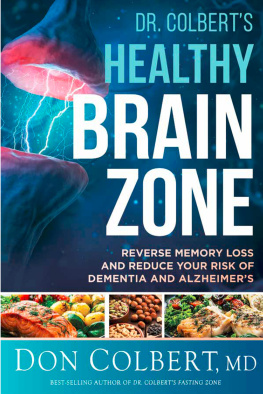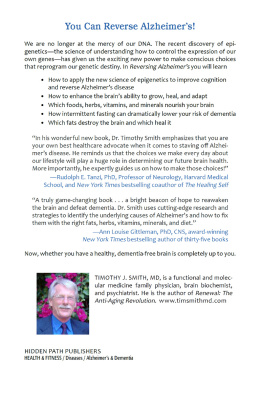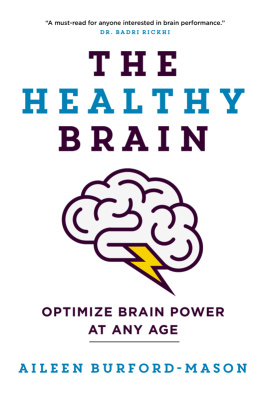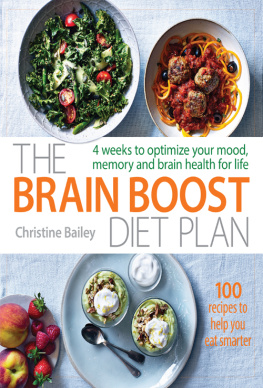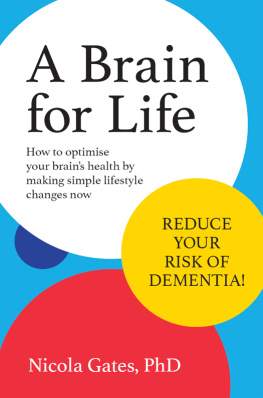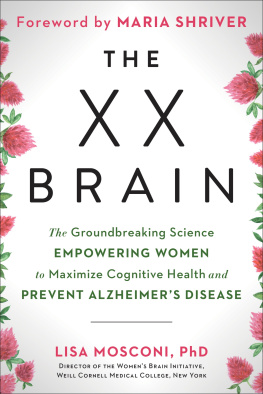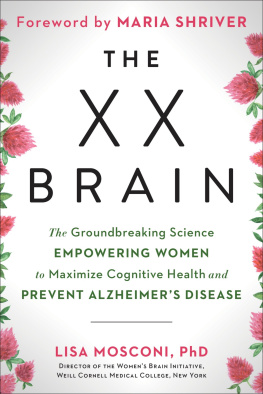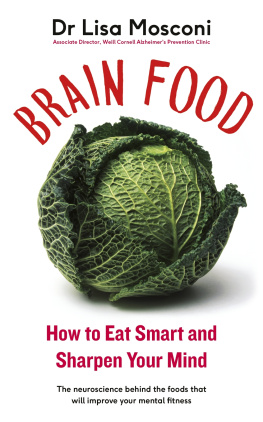Penguin supports copyright. Copyright fuels creativity, encourages diverse voices, promotes free speech, and creates a vibrant culture. Thank you for buying an authorized edition of this book and for complying with copyright laws by not reproducing, scanning, or distributing any part of it in any form without permission. You are supporting writers and allowing Penguin to continue to publish books for every reader.
Neither the publisher nor the author is engaged in rendering professional advice or services to the individual reader. The ideas, procedures, and suggestions contained in this book are not intended as a substitute for consulting with your physician. All matters regarding your health require medical supervision. Neither the author nor the publisher shall be liable or responsible for any loss or damage allegedly arising from any information or suggestion in this book.
PREFACE
A few years ago, I delivered the keynote at an international conference on the prevention of Alzheimers disease. It was a beautiful sunny day in Italy, the lecture hall brimming with doctors, students, and laymen, all eager to hear the latest on pharmacological treatments for Alzheimers.
I was much less eager to be the bearer of bad news. Unfortunately, current medications for Alzheimers lessen symptoms for a limited amount of time but cannot stop the damage that aging and disease cause to brain cells. A new generation of disease-modifying drugs is under development, but clinical trials have yielded mostly disappointing results so far, confirming what everyone knew: there is no cure in sight.
At which point someone in the audience asked: How about olive oil?
My neuroscience-trained brain was baffled. Olive oil?
Olive oil was not in any of my research proposals, or in any way part of my education. I got my PhD in neuroscience and nuclear medicine to focus on the genetic aspects of the disease, motivated in part by seeing its devastating effects on my immediate family. My work for the last fifteen years has been focused on the early detection of Alzheimers. Specifically, in my research I use brain imaging techniques, such as magnetic resonance imaging (MRI) and positron emission tomography (PET), to look at peoples brains in relationship to their genetic backgrounds, and in doing so, learn about their likelihood of developing disease.
This work led me to direct the Family History of Alzheimers research program at the NYU School of Medicine back in 2009. The program focuses on the children and family members of Alzheimers patients. Everyone there has broadly the same concern: Am I at risk for Alzheimers and what can I do to make sure I dont get it?
Over the years, I experienced a change in the kinds of questions I was asked by our patients, much like the olive oil question at the conference. Beyond the discussions about genes and DNA, sooner or later the conversation turned to food: What should I eat to keep my brain healthy?
While all my research draws on my education as an adult, everything I associate with food comes from my upbringing in Florence, Italy. Back in my hometown, I developed a heartfelt appreciation for wholesome, healthy food from a very young age, which I took for granted until I moved to the United States to study for my PhD. I had not anticipated the challenge of finding a flavorful tomato or the artery-clogging danger hidden within a seemingly innocent chocolate chip cookie. As I struggled with my own diet in my new environment, I learned from my research that I was not alone. By their own accounts, more than half of my study participants reported only trace amounts of vegetables and fruits in their diets.
Little by little, it became clear that I wasnt just far from home. I was also far from the original theses about the genetic aspects of dementia. In fact, it turns out that the role of genetics in Alzheimers, and dementia in general, is not as major as we previously thought. While some patients carry aggressive genetic mutations that cause dementia, for the vast majority of the population, risk is influenced by a variety of medical and lifestyle factorsincluding a persons diet. When my research revealed how important, and how oddly neglected, diet and nutrition had been in the field, I went back to school and completed a third degree in integrative nutrition. I drew upon that and other work to found the Nutrition & Brain Fitness Lab at NYU, with the goal of identifying lifestyle factors that support the brains health, safeguarding it against dementia. A few years later, I initiated the Brain Nutrition coursework and began teaching at the NYU Steinhardt Schools Department of Nutrition and Food Studies. Around the same time, I moved to Weill Cornell Medical College, where I have the honor of serving as the Associate Director of the first Alzheimers Prevention Clinic in the country. The clinics innovative approach includes pharmaceutical as well as behavioral interventions aimed at improving both medical status and lifestyle choices in an Alzheimers-preventative way. Diet and nutrition are a big part of the practice. Altogether, this work has led me to dive headfirst into the complex relationship between our brains and the foods we eat, and to educate the public as to how to eat healthfully for their brains.
As with anyone who has ever gone down a dietary path toward optimal nutrition, I quickly realized that the available advice was often conflicting and incoherent. But as a scientist, I was above all surprised at the volume and effect of pseudo-scientific information available on the Internet, especially in comparison with how little had been published with the rigor of peer-reviewed medical journals.
Weve heard a lot about what is and isnt good for our brains. For example, many of us have recently become aware of an American gluten panic. But only a few years ago, grains were considered the epitome of eating healthyand people were terrified of eating fatty foods. The problem is that while many of the recommendations you can find online promote a scientific worldview, very few have been substantiated by sound research. The Internet and media in particular have a tendency to make broad extrapolations on limited findings and sensationalize everything. For instance, at least once a week someone will ask my opinion on the latest miracle drug for Alzheimers. Ill look up the study. More often than not, its true that the drug worked... but in a population of ten mice. So thats great news if you are one of those ten mice. Whether or not those findings are relevant to people is a whole different story.
This is where scientific literacy comes into play. Which sources of information are the most credible? How can we know if the study we heard about in the evening news is worth acting upon?
While sound scientific research is more limited than Internet blogs, results do prove to be consistent. A new generation of studies has begun to identify which nutrients are particularly helpful in enabling our brains to work at the max, as well as protecting them as we age, thereby granting us continued mental strength over the course of a lifetime. At the same time, we are also learning which nutrients are harmful to the brain, negatively affecting our cognitive abilities and increasing the risk of mental deterioration. This includes my personal experience accumulated over years of hands-on research regarding the important interactions among genetics, nutrition, and lifestyle.



